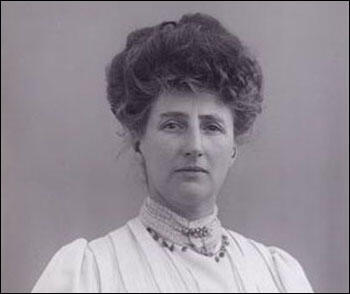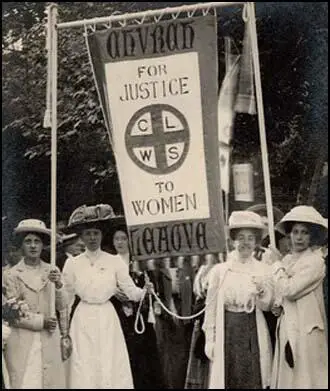Church League for Women's Suffrage
The Church League for Women's Suffrage (CLWS) was founded by the Reverend Claude Hinscliffe in 1909. The inaugural meeting of the CLWS took place on 2nd December. Hinscliffe argued the objective was "to secure for women the Parliamentary Vote as it is or may be granted to men; to use the power thus obtained to establish equality of rights and opportunities between the sexes, and to promote the social and industrial well-being of the community." (1)
His intention was to: "band together, on a non-party basis, Suffragists of every shade of opinion who are Church people in order to secure for women the vote in Church and State, as it is or may be granted to men." Later he stated that: "The methods of the League are Devotional and Educational." The following year Maude Royden became secretary of the CLWS.Other members included Margaret Nevinson, Edith Mansell Moullin, Florence Canning, Minnie Baldock, Clare Mordan, Olive Wharry and Katherine Harley. (2)

Florence Canning was elected as Chairman of the Executive of the Church League for Women's Suffrage (CLWS) in early 1912. By 1913 the CLWS had 103 branches and 5,080 members. It faced a great deal of hostility from the Church establishment. The Church Times reported a H. W. Hill as saying: "For any sane person the thing is so absolutely grotesque that he must refuse to discuss it. The monstrous regiment of women in politics would be bad enough but the monstrous regiment of priestesses would be a thousandfold worse." (3)

In 1918 she spoke in Hudson Shaw's church on the League of Nations and Christianity. As a result he was rebuked by the Bishop of London. Shaw asked her to preach at the three hours' service on Good Friday (18th April). The bishop forbade it, on the grounds that this was an especially ‘sacred’ service. Soon afterwards, the Church League for Women's Suffrage, resolved to campaign not only for the preaching but the priesthood of women.
In 1921 Maude Royden established the Guildhouse, an ecumenical place of worship and a cultural centre. On Sunday afternoons there were talks about politics and the arts. Royden preached at the Sunday evening service to a congregation from all over London. She became famous and was asked to preach all over the world.
Primary Sources
(1) Maude Royden, The Guildhall Monthly (April 1929)
I am not going to speak tonight about the book called The Well of Loneliness which was during my absence abroad published here and then banned, but about the subject of that book. I do not suppose Miss Radclyfte-Hall desired the kind of advertisement that has been given to the book, but since it happened, and since the book has, largely in consequence of that advertisement, been very widely read, I feel bound to say that I find it difficult to understand why an official who permits the publication of books so filthy that it soils the mind to read them, and the production of plays in which everything that is connected with sex is degraded, in which marriage and adultery alike are treated as though they were rather a nasty joke, should have fastened on this particular book as being unfit for us to read. I do not desire that those other books or plays should be suppressed; I have no faith at all in that way of dealing with evil. It is better to concentrate our efforts on trying to be interested in something that is good than to take a short cut to virtue by repressing what is evil. But if there is to be censorship, why was this book chosen. I wish publicly to state that I honour the woman who wrote it, alike for her courage and her understanding; that I find her as just as she is merciful and as merciful as she is just; that her book seems to me to be altogether on the side of what is normal and right; and I do not understand how anyone can read that book patiently from start to finish, and not see that that is the conclusion of the matter.
These, however, are not reasons why I should preach about this book or on this subject. My reasons are these. The book is being very widely read. It is being widely read by members of this congregation, and by the younger members, who perhaps of all the people of my congregation are most - I will not say most clear to my heart, for all my congregation are clear - but most near to my conscience. And I have found that the advice frequently given by well-meaning, but almost incredibly ignorant people on this subject, is often tragic in its effect, not only on the lives of the abnormal but in the lives of others, normal or capable of becoming so.
What then is my subject? It is the fact that between people of the same sex friendship sometimes reaches a pitch of intensity which longs for physical contact, and for those intimacies and caresses which are normally only desired and only given between people of opposite sex. I do not say this love is more profound than any other kind of love, for the love of parents for their children, sometimes of brothers and sisters, sometimes of a more normal type of friendship, is sometimes quite as profound as the love of lovers. It may be, even in the life of a perfectly normal person, that the love of children is his - or more commonly her - ruling passion. But, even so, it has a different quality from sex-love; and it is this quality which sometimes exists between men for each other, and women for each other, and which creates the difficulties I speak of to-night.
If to some of you this "passionate friendship" seems quite incomprehensible, I ask you nevertheless to accept the fact that it does exist It is not even a new thing; it is not a consequence of the unnatural excitement and loneliness of the war and post-war periods.
I am going to assume tonight that what I call the "true" invert, the person who cannot be altered either by psychologists or physiologists does actually exist. His abnormality is not due to delayed or even arrested development: it is inherent and incurable. Whence do they come: "God made us," they reply: "what is he going to do with us"...
Consider - the invert can have no children and no home in our sense of the word. His love, which seems to him as sacred as yours and mine, must seem to the world horrible. He creates no new centre of life from which life conies into the world. There is no pull outward again when he turns inwards: the rhythm of creation is broken. When two lovers, a man and a woman, meet in marriage, their love turns into itself but it creates something, which draws them out again. The act of creation creates new life, and the parents' love is drawn out as the lovers' love was drawn in, and there is present the infolding and unfolding, the great and wonderful rhythm which runs through all life. But to the invert's love, this is impossible. The rhythm is broken. Love turns inwards and is locked there. The biological failure to create is paralleled by a spiritual failure. Need it be so, some of you ask? Cannot the love of the invert for his own sex, for her own sex, even though it be expressed physically, result in a spiritual creation? I do not think so. If it is to result in spiritual creation, it must be kept on a spiritual plane. If it yields to the desire for physical expression, it becomes spiritually valueless. Love is sacred - yes, all love is sacred. Let us never forger that. But love is
naturally creative and sterile love is a contradiction in terms. It is the function of love to create, just as it is tile function of hatred to destroy, for love is the very principle of creation, and to ask "Why did God create" is to ask a question without meaning. He creates because it is the nature of love to create. But when the invert argues that his love also may create spiritually, I think he falls into a fallacy; it creates spiritually only by the hard necessity of remaining a spiritual passion. I know the happiness that comes of a loneliness that is broken at last seems a release, and for a time there Is a sense of being satisfied; but that is all. Such love does not turn outwards to the creation of life, and it remains a secret.
I submit that the invert should accept the fact of his own nature and consequent suffering, and not try to escape it. This is the kind of thing I am ashamed to say, knowing how often I have sought and seek to escape pain. Have we not all tried to escape from suffering and loneliness? If I dare to say to the invert, "you must not try to escape, it is because I am certain that in one sense you cannot escape altogether." But it you accept your suffering, you will find that you are one of a great company. The form of your suffering is lonely, but the fact of your suffering is common, for all whose lives are worth living suffer - all of them. You will find yourself not alone in the deepest sense, for this great company of sufferers becomes to you more than a company; it is a communion, a communion of the deepest of human experiences. The experience of a pain that you accept and do not try to escape makes you one of that great host of martyrs, prophets and saints, in whose hearts there is always a cross. In this communion loneliness is transcended.

